七年级下册 Module 9 Life history Unit 3 Language in use 课件(共30张PPT)
文档属性
| 名称 | 七年级下册 Module 9 Life history Unit 3 Language in use 课件(共30张PPT) |
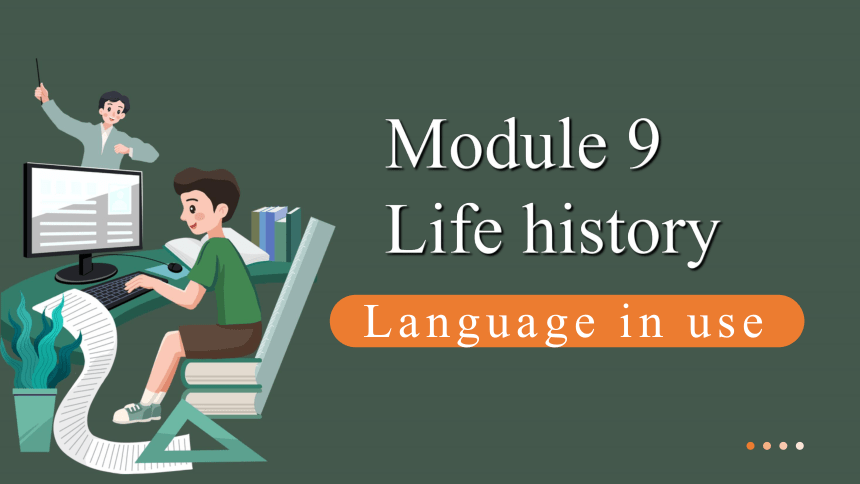
|
|
| 格式 | pptx | ||
| 文件大小 | 881.2KB | ||
| 资源类型 | 教案 | ||
| 版本资源 | 外研版 | ||
| 科目 | 英语 | ||
| 更新时间 | 2023-06-16 00:00:00 | ||
图片预览

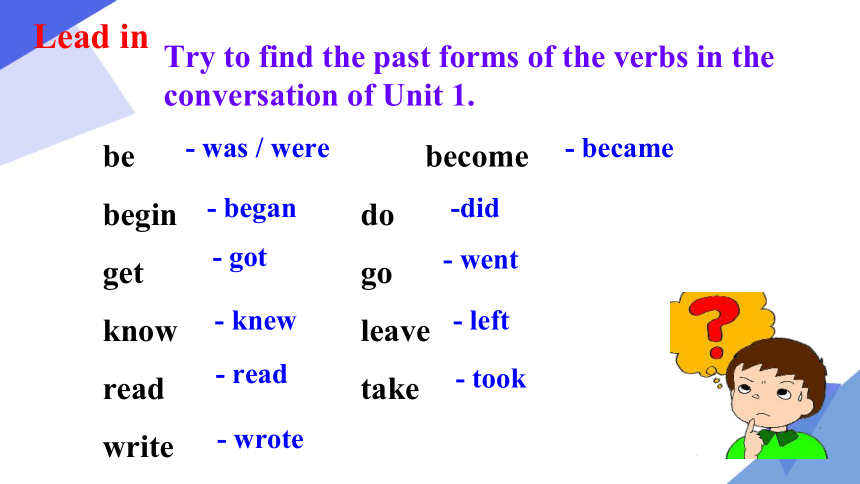
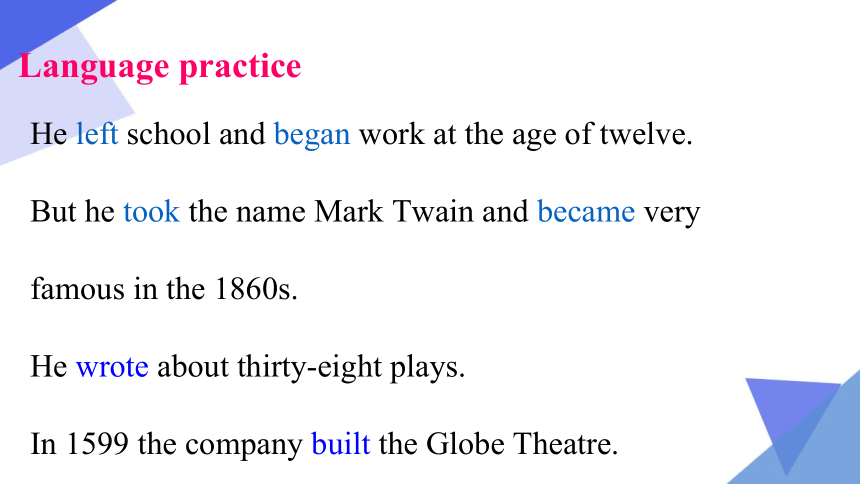
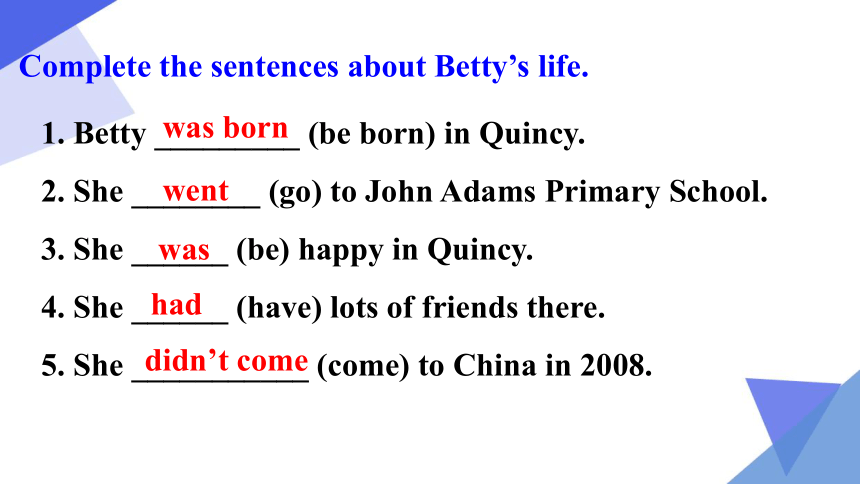

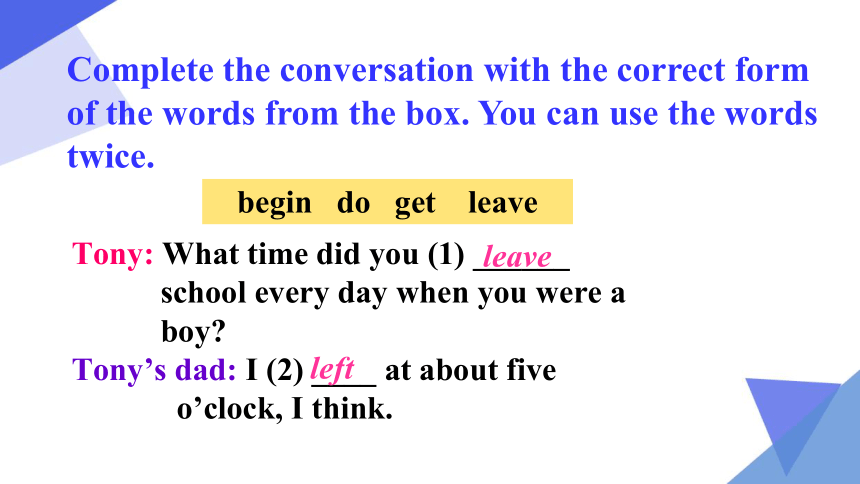
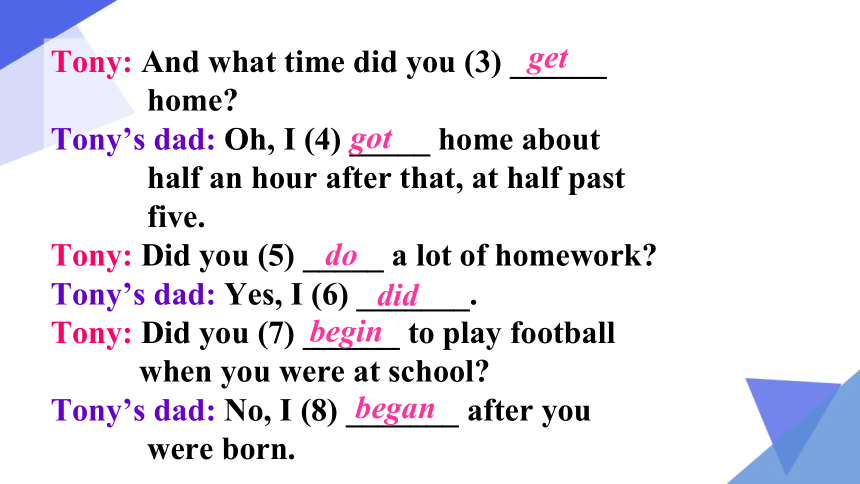
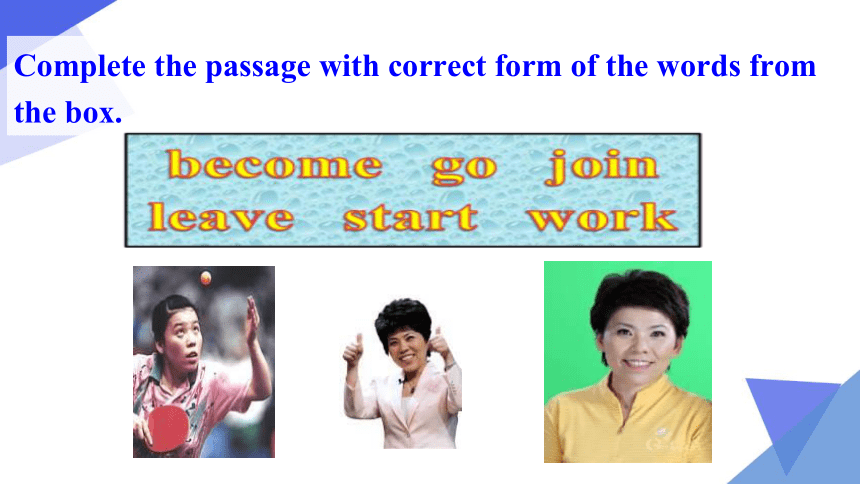

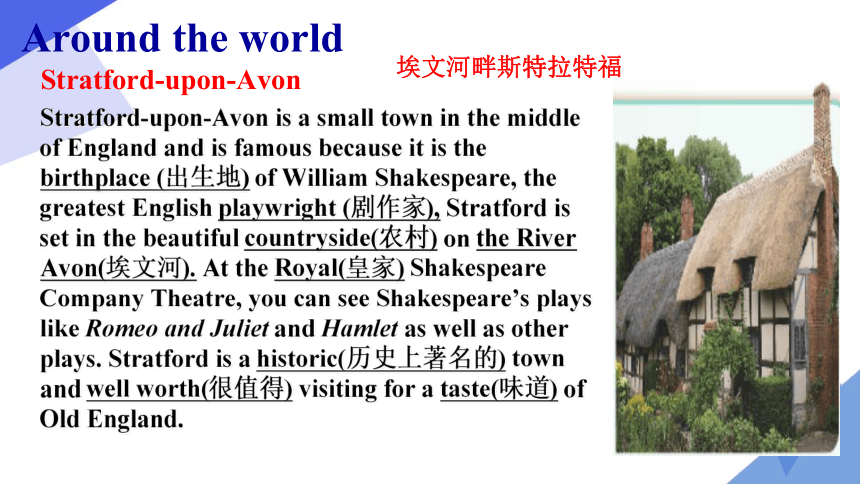
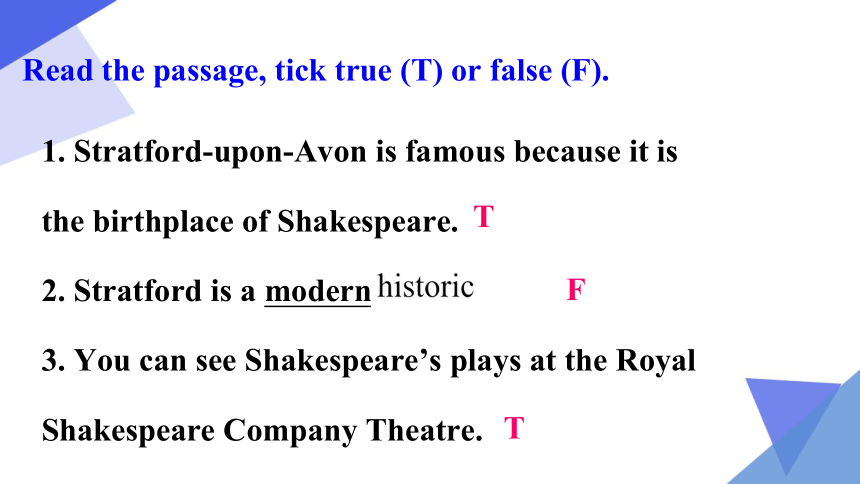

文档简介
(共30张PPT)
Language in use
Module 9
Life history
Lead in
Try to find the past forms of the verbs in the conversation of Unit 1.
be become
begin do
get go
know leave
read take
write
- was / were
- began
- got
- knew
- read
- wrote
- became
-did
- went
- left
- took
Language practice
He left school and began work at the age of twelve.
But he took the name Mark Twain and became very famous in the 1860s.
He wrote about thirty-eight plays.
In 1599 the company built the Globe Theatre.
Complete the sentences about Betty’s life.
1. Betty _________ (be born) in Quincy.
2. She ________ (go) to John Adams Primary School.
3. She ______ (be) happy in Quincy.
4. She ______ (have) lots of friends there.
5. She ___________ (come) to China in 2008.
was born
went
was
had
didn’t come
Complete the passage with the correct form of the words.
When my father was young, he (1) __________ (not have) much money. He (2) ________ (begin) work at eight o’clock and (3) ______ (leave) at five.
didn’t have
began
left
When he (4) _______ (get) home, he always (5) ________ (read) a book. In the evening he (6) ________ (go) to the park and (7) ________ (have) a good time.
got
read
went
had
Complete the conversation with the correct form of the words from the box. You can use the words twice.
begin do get leave
Tony: What time did you (1) ______
school every day when you were a
boy
Tony’s dad: I (2) ____ at about five
o’clock, I think.
leave
left
Tony: And what time did you (3) ______
home
Tony’s dad: Oh, I (4) _____ home about
half an hour after that, at half past
five.
Tony: Did you (5) _____ a lot of homework
Tony’s dad: Yes, I (6) _______.
Tony: Did you (7) ______ to play football
when you were at school
Tony’s dad: No, I (8) _______ after you
were born.
get
got
begin
began
did
do
Complete the passage with correct form of the words from the box.
Deng Yaping was born in 1973 in Zhengzhou, China. She (1) ______ playing table tennis at five. She was only fifteen when she won her first match for China. She (2) ________ the National Team in 1988. Deng won Olympic gold four times and she (3)_________ famous all over the world.
joined
became
started
At the age of twenty-four, Deng Yaping (4) ____theNational Team and became a student. She (5) _______very hard. She then (6) _______ to England and studied there.
left
worked
went
Stratford-upon-Avon
Stratford-upon-Avon is a small town in the middle of England and is famous because it is the birthplace (出生地) of William Shakespeare, the greatest English playwright (剧作家), Stratford is set in the beautiful countryside(农村) on the River Avon(埃文河). At the Royal(皇家) Shakespeare Company Theatre, you can see Shakespeare’s plays like Romeo and Juliet and Hamlet as well as other plays. Stratford is a historic(历史上著名的) town and well worth(很值得) visiting for a taste(味道) of Old England.
Around the world
埃文河畔斯特拉特福
Read the passage, tick true (T) or false (F).
1. Stratford-upon-Avon is famous because it is the birthplace of Shakespeare.
2. Stratford is a modern(现代的) town.
3. You can see Shakespeare’s plays at the Royal Shakespeare Company Theatre.
T
F
T
historic
一般过去时的用法
1、表示过去某个时间发生的动作或存在的状态。
He was at home yesterday.
I got up at six thirty yesterday morning.
I visited my aunt last weekend.
2、表示过去经常或反复发生的动作。
My father often went to work by bus last year.
When I was a child, I often listened to music.
一般过去时的标志词
1.just now
2.yesterday...
3.last...
4....ago
5.in+过去年月
9.at the age of...
=when I was...
7.once upon a time
8.then=at that time
6.in the past
一般过去时的变化规则
1.be 动词过去式
2.情态动词过去式
3.规则动词过去式
am/is--was are--were
can--could may--might will --would
1.一般动词词尾加—
ed
2.以不发音字母“ ___”为结尾的动词后加_____
e
d
3.以辅音字母加__结尾的动词,
变___为___,再加_____ .
y
y
i
ed
4.以重读闭音节结尾的动词,先______后面的辅音字母,再加-ed.
双写
2. 只变一个元音字母:
o-a come-came become-became
i-a begin-began drink-drank give-gave
ring-rang sing-sang swim-swam
i-o win-won drive-drove ride-rode
o-e throw-threw know-knew
a-e draw-drew fall-fell
e-o get-got forget-forgot
1. 不变
cost-cost hurt-hurt put-put let-let read-read
一般过去时的不规则变化
3.只变一个辅音字母:
build-built has / have-had
lend-lent lose-lost
make-made send-sent spend-spent
增加一个辅音字母:
hear-heard burn-burnt
learn-learnt mean-meant
一般过去时的不规则变化
4.改变两个元音字母:
break-broke speak-spoke
choose-chose feed-fed
meet-met feel-felt
sweep-swept wear-wore
lie-lay say-said see-saw
5.过去式含有ought / aught:
buy-bought bring-brought
fight-fought think-thought
catch-caught teach-taught
6.情态动词:
can-could shall-should
will-would may-might
7.原形中有-ell:
sell-sold tell-told smell-smelt
8.其他:
be-was/were do-did find-found
fly-flew go-went leave-left
stand-stood understand-understood
be — was/were leave — left
buy— bought meet — met
come — came read — read
do — did see — saw
get — got spend— spent
have — had swim — swam
write —wrote take — took
常见的动词过去式
Task 1写出下列动词的过去式
get
is
live
send
spend
run
look
walk
say
hurry
are
eat
work
stop
do
meet
visit
see
decide
buy
got
was
lived
sent
spent
ran
looked
walked
said
hurried
were
ate
worked
stopped
did
met
visited
saw
decided
bought
肯定句
否定句
疑问句
主语 + be动词的过去式( )+其他.
主语 + be动词的过去式( )+ not +其他.
Be 动词的过去式( )+主语 +其他
He was busy yesterday.
否定句:He _________ busy yesterday.
疑问句 :____ he busy yesterday
含be 动词的过去时结构:
was, were
was, were
was, were
was not
Was
( )1. _______ you difficult in 2004
A. Was B. Were C. Are D. is
( )2. There _______ a lot of flowers in the garden
last week.
A. is B. are C. was D. were
B
D
( )3. Where ________ you last night I ______
at home.
A. were, am B. were ,was C. was,was
B
Task2 单项选择
肯定
否定
疑问
主语 + 行为动词的过去式+其他.
主语 +___+ V原型+其他.
Did +主语+V原型 +其他
He walked to school yesterday.
He _____ walk to school yesterday.
_____he walk to school yesterday
含行为 动词的过去时结构:
回答
肯定:主语+did
否定:主语+didn’t
肯定回答:_____________
否定回答:_____________
didn’t
didn’t
Did
Yes, he did.
No, he didn’t.
注:陈述句变否定句时some --any
and --or
too--either
1.They ______have a picnic next weekend.
A.went to B.are going to C.go to
2.They _____ games in the park now.
A.played B.are playing C.play
3.Daming _____ school every day.
A.walked B.will walk C.walks
She ______ a film last weekend.
A. saw B.is going to see C.is seeing
Task 3 单项选择
√
√
√
√
归纳:一般过去时 sb. did sth.
一般现在时 sb.do/does sth
一般将来时 sb.will do sth./sb.be going to do sth.
现在进行时 sb. be doing sth.
( )1. David is a tennis player. He _____ to play tennis
when he was six years old.
A. begins B. will begin
C. began D. has begun
( )2. Could you please say it again I _____ quite _____
you.
A. didn’t; hear B. don’t; heard
C. didn’t; heard D. don’t; hear
C
A
Task 4 语法巩固
( )3. —When will Uncle Sam come to see us
—He’ll visit us this weekend. He _____ me that by
email yesterday.
A. told B. is told
C. will tell D. was going to tell
( )4. —_____ you at home yesterday evening
—Yes, I _____ with my mother.
A. Were; were B. Was; was
C. Were; was D. Was; were
( )5. The students _____ the floor just now.
A. sweep B. swept
C. were swept D. was sweeping
A
C
B
Ⅱ. 用所给单词的适当形式填空。
1. My sister _________ (buy) a new iPhone X for me
yesterday.
2. —Where did you _____ up
—I _____ up right here in this neighborhood. (grow)
3. We _____ (have) a party last night.
4. Tom and Mary _____ (come) to China last month.
5. Mike _________ (not go) to bed until 12 o’clock last night. So he _____ (get) up late.
bought
grow
grew
had
came
didn’t go
got
Ⅱ. 用所给单词的适当形式填空。
1. Mary _____ (read) English yesterday morning.
2. I listened but _______ (hear) nothing.
3. Tom ______ (begin) to learn Chinese last year.
4. What ______ (make) him cry just now
5. Last year the teacher _____ (tell) us that the earth moves around the sun.
read
heard
began
made
told
Homework
Review and recite the important points of Module 9.
复习并记忆模块9 的重点内容。
Language in use
Module 9
Life history
Lead in
Try to find the past forms of the verbs in the conversation of Unit 1.
be become
begin do
get go
know leave
read take
write
- was / were
- began
- got
- knew
- read
- wrote
- became
-did
- went
- left
- took
Language practice
He left school and began work at the age of twelve.
But he took the name Mark Twain and became very famous in the 1860s.
He wrote about thirty-eight plays.
In 1599 the company built the Globe Theatre.
Complete the sentences about Betty’s life.
1. Betty _________ (be born) in Quincy.
2. She ________ (go) to John Adams Primary School.
3. She ______ (be) happy in Quincy.
4. She ______ (have) lots of friends there.
5. She ___________ (come) to China in 2008.
was born
went
was
had
didn’t come
Complete the passage with the correct form of the words.
When my father was young, he (1) __________ (not have) much money. He (2) ________ (begin) work at eight o’clock and (3) ______ (leave) at five.
didn’t have
began
left
When he (4) _______ (get) home, he always (5) ________ (read) a book. In the evening he (6) ________ (go) to the park and (7) ________ (have) a good time.
got
read
went
had
Complete the conversation with the correct form of the words from the box. You can use the words twice.
begin do get leave
Tony: What time did you (1) ______
school every day when you were a
boy
Tony’s dad: I (2) ____ at about five
o’clock, I think.
leave
left
Tony: And what time did you (3) ______
home
Tony’s dad: Oh, I (4) _____ home about
half an hour after that, at half past
five.
Tony: Did you (5) _____ a lot of homework
Tony’s dad: Yes, I (6) _______.
Tony: Did you (7) ______ to play football
when you were at school
Tony’s dad: No, I (8) _______ after you
were born.
get
got
begin
began
did
do
Complete the passage with correct form of the words from the box.
Deng Yaping was born in 1973 in Zhengzhou, China. She (1) ______ playing table tennis at five. She was only fifteen when she won her first match for China. She (2) ________ the National Team in 1988. Deng won Olympic gold four times and she (3)_________ famous all over the world.
joined
became
started
At the age of twenty-four, Deng Yaping (4) ____theNational Team and became a student. She (5) _______very hard. She then (6) _______ to England and studied there.
left
worked
went
Stratford-upon-Avon
Stratford-upon-Avon is a small town in the middle of England and is famous because it is the birthplace (出生地) of William Shakespeare, the greatest English playwright (剧作家), Stratford is set in the beautiful countryside(农村) on the River Avon(埃文河). At the Royal(皇家) Shakespeare Company Theatre, you can see Shakespeare’s plays like Romeo and Juliet and Hamlet as well as other plays. Stratford is a historic(历史上著名的) town and well worth(很值得) visiting for a taste(味道) of Old England.
Around the world
埃文河畔斯特拉特福
Read the passage, tick true (T) or false (F).
1. Stratford-upon-Avon is famous because it is the birthplace of Shakespeare.
2. Stratford is a modern(现代的) town.
3. You can see Shakespeare’s plays at the Royal Shakespeare Company Theatre.
T
F
T
historic
一般过去时的用法
1、表示过去某个时间发生的动作或存在的状态。
He was at home yesterday.
I got up at six thirty yesterday morning.
I visited my aunt last weekend.
2、表示过去经常或反复发生的动作。
My father often went to work by bus last year.
When I was a child, I often listened to music.
一般过去时的标志词
1.just now
2.yesterday...
3.last...
4....ago
5.in+过去年月
9.at the age of...
=when I was...
7.once upon a time
8.then=at that time
6.in the past
一般过去时的变化规则
1.be 动词过去式
2.情态动词过去式
3.规则动词过去式
am/is--was are--were
can--could may--might will --would
1.一般动词词尾加—
ed
2.以不发音字母“ ___”为结尾的动词后加_____
e
d
3.以辅音字母加__结尾的动词,
变___为___,再加_____ .
y
y
i
ed
4.以重读闭音节结尾的动词,先______后面的辅音字母,再加-ed.
双写
2. 只变一个元音字母:
o-a come-came become-became
i-a begin-began drink-drank give-gave
ring-rang sing-sang swim-swam
i-o win-won drive-drove ride-rode
o-e throw-threw know-knew
a-e draw-drew fall-fell
e-o get-got forget-forgot
1. 不变
cost-cost hurt-hurt put-put let-let read-read
一般过去时的不规则变化
3.只变一个辅音字母:
build-built has / have-had
lend-lent lose-lost
make-made send-sent spend-spent
增加一个辅音字母:
hear-heard burn-burnt
learn-learnt mean-meant
一般过去时的不规则变化
4.改变两个元音字母:
break-broke speak-spoke
choose-chose feed-fed
meet-met feel-felt
sweep-swept wear-wore
lie-lay say-said see-saw
5.过去式含有ought / aught:
buy-bought bring-brought
fight-fought think-thought
catch-caught teach-taught
6.情态动词:
can-could shall-should
will-would may-might
7.原形中有-ell:
sell-sold tell-told smell-smelt
8.其他:
be-was/were do-did find-found
fly-flew go-went leave-left
stand-stood understand-understood
be — was/were leave — left
buy— bought meet — met
come — came read — read
do — did see — saw
get — got spend— spent
have — had swim — swam
write —wrote take — took
常见的动词过去式
Task 1写出下列动词的过去式
get
is
live
send
spend
run
look
walk
say
hurry
are
eat
work
stop
do
meet
visit
see
decide
buy
got
was
lived
sent
spent
ran
looked
walked
said
hurried
were
ate
worked
stopped
did
met
visited
saw
decided
bought
肯定句
否定句
疑问句
主语 + be动词的过去式( )+其他.
主语 + be动词的过去式( )+ not +其他.
Be 动词的过去式( )+主语 +其他
He was busy yesterday.
否定句:He _________ busy yesterday.
疑问句 :____ he busy yesterday
含be 动词的过去时结构:
was, were
was, were
was, were
was not
Was
( )1. _______ you difficult in 2004
A. Was B. Were C. Are D. is
( )2. There _______ a lot of flowers in the garden
last week.
A. is B. are C. was D. were
B
D
( )3. Where ________ you last night I ______
at home.
A. were, am B. were ,was C. was,was
B
Task2 单项选择
肯定
否定
疑问
主语 + 行为动词的过去式+其他.
主语 +___+ V原型+其他.
Did +主语+V原型 +其他
He walked to school yesterday.
He _____ walk to school yesterday.
_____he walk to school yesterday
含行为 动词的过去时结构:
回答
肯定:主语+did
否定:主语+didn’t
肯定回答:_____________
否定回答:_____________
didn’t
didn’t
Did
Yes, he did.
No, he didn’t.
注:陈述句变否定句时some --any
and --or
too--either
1.They ______have a picnic next weekend.
A.went to B.are going to C.go to
2.They _____ games in the park now.
A.played B.are playing C.play
3.Daming _____ school every day.
A.walked B.will walk C.walks
She ______ a film last weekend.
A. saw B.is going to see C.is seeing
Task 3 单项选择
√
√
√
√
归纳:一般过去时 sb. did sth.
一般现在时 sb.do/does sth
一般将来时 sb.will do sth./sb.be going to do sth.
现在进行时 sb. be doing sth.
( )1. David is a tennis player. He _____ to play tennis
when he was six years old.
A. begins B. will begin
C. began D. has begun
( )2. Could you please say it again I _____ quite _____
you.
A. didn’t; hear B. don’t; heard
C. didn’t; heard D. don’t; hear
C
A
Task 4 语法巩固
( )3. —When will Uncle Sam come to see us
—He’ll visit us this weekend. He _____ me that by
email yesterday.
A. told B. is told
C. will tell D. was going to tell
( )4. —_____ you at home yesterday evening
—Yes, I _____ with my mother.
A. Were; were B. Was; was
C. Were; was D. Was; were
( )5. The students _____ the floor just now.
A. sweep B. swept
C. were swept D. was sweeping
A
C
B
Ⅱ. 用所给单词的适当形式填空。
1. My sister _________ (buy) a new iPhone X for me
yesterday.
2. —Where did you _____ up
—I _____ up right here in this neighborhood. (grow)
3. We _____ (have) a party last night.
4. Tom and Mary _____ (come) to China last month.
5. Mike _________ (not go) to bed until 12 o’clock last night. So he _____ (get) up late.
bought
grow
grew
had
came
didn’t go
got
Ⅱ. 用所给单词的适当形式填空。
1. Mary _____ (read) English yesterday morning.
2. I listened but _______ (hear) nothing.
3. Tom ______ (begin) to learn Chinese last year.
4. What ______ (make) him cry just now
5. Last year the teacher _____ (tell) us that the earth moves around the sun.
read
heard
began
made
told
Homework
Review and recite the important points of Module 9.
复习并记忆模块9 的重点内容。
同课章节目录
- Module 1 Lost and found
- Unit 1 Whose bag is this?
- Unit 2 Are they yours?
- Unit 3 Language in use
- Module 2 What can you do ?
- Unit 1 I can play the piano
- Unit 2 I can run really fast
- Unit 3 Language in use
- Module 3 Making plans
- Unit 1 What are you going to do at the weekends?
- Unit 2 We're going to cheer the players.
- Unit 3 Language in use
- Module 4 Life in the future
- Unit 1 Everyone will study at home
- Unit 2 Every family will have a small plane.
- Unit 3 Language in use
- Module 5 Shopping
- Unit 1 What can I do for you?
- Unit 2 You can buy everything on the Internet
- Unit 3 Language in use
- Module 6 Around town
- Unit 1 Could you tell me how to get to the Nationa
- Unit 2 The London Eye is on your right.
- Unit 3 Language in use
- Revision module A
- Module 7 My past life
- Unit 1 I was born in a small village.
- Unit 2 I was born in Quincy.
- Unit 3 Language in use
- Module 8 Story time
- Unit 1 Once upon a time….
- Unit 2 Goldilocks hurried out of the house.
- Unit 3 Language in use
- Module 9 Life history
- Unit 1 He left school and began work at the age of
- Unit 2 He decided to be an actor.
- Unit 3 Language in use
- Module 10 A holiday journey
- Unit 1 What did you do?
- Unit 2 This morning we took a walk.
- Unit 3 Language in use
- Module 11 Body language
- Unit 1 They touch noses!
- Unit 2 Here are some ways to welcome them.
- Unit 3 Language in use
- Module 12 Western music
- Unit 1 It's so beautiful!
- Unit 2 Vienna is the centre of European classical
- Unit 3 Language in use
- Revision module B
